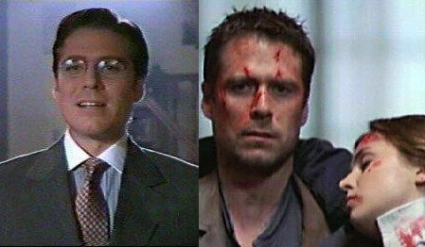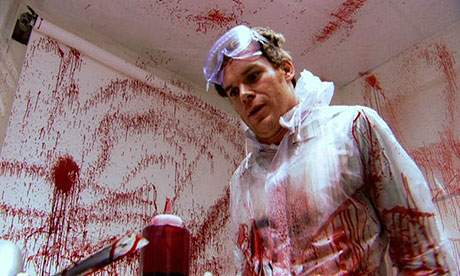With Lost having come to a close early this week, let's talk television. So stories are all about characters and their development. In a film, the big question is - what can the character do at the end that they were unable to do at the beginning? In other words - how have they changed?
 In TV, however, this doesn't apply. Rather, the non-development of a character is what the show depends on.Let's say your character is someone who fights aliens for a living. If, after season 1, they no longer want or need to fight aliens, then they have developed, yes, but there is no story left to tell.
In TV, however, this doesn't apply. Rather, the non-development of a character is what the show depends on.Let's say your character is someone who fights aliens for a living. If, after season 1, they no longer want or need to fight aliens, then they have developed, yes, but there is no story left to tell.Or, perhaps a character's defining trait is the need to unravel the mystery behind a world-wide blackout that leaps to a particular date. If that date comes and goes, then there's nothing left for him to do. FlashForward got axed a bit ago btw.....
Movies tell us about a small, defining part of a person's life (the moment they realise they are The One, the moment a cyborg comes back in time to kill them, the moment a Roman General is thrown into slavery etc). But in TV, we get several years (hopefully) of a character's experience - what we care about is their day-to-day activities in whatever field they belong.
As a wise man once said:
In the end, we are all who we are, no matterSo with TV depending on characters not changing, how can they be developed without becoming boring?
how much we may appear to have changed.- Rupert Giles, Buffy the Vampire Slayer.
A character doesn't have to change the fundamental traits of themselves in order to develop. We all change as people throughout our lives, but I don't ever stop wanting to be a writer. Likewise, the doctor may leave her husband, rob a bank and win the lottery, but they never stop being a doctor.
One character that changed dramatically in Buffy/Angel is Wesley. He joined Buffy season 3 as a jittery, comical uber-embarrassing version of Giles. But by the finale of Angel season 5 (6 years later) he'd become a Rogue Demon Hunter, betrayed everyone's trust, kidnapped his best friend's son, been exiled by the group, led the group, had his throat slit, shot and killed his father (kind of) and held the love of his life in his arms while she died, not to mention battle all manner of grizzly demons, including a particularly nasty warlock.
 Upon being faced with a tough decision, Buffy season 1 Wesley would have run to help. Whereas Angel season 5 Wesley would have made the call, regardless of the consequences.
Upon being faced with a tough decision, Buffy season 1 Wesley would have run to help. Whereas Angel season 5 Wesley would have made the call, regardless of the consequences.Supernatural's Dean Winchester hasn't changed that much over 4 and a half seasons in personality; his key trait (the way he mouths off at absolutely every demon around with a devil-may-care persona) remains, but I can't be the only person noticing differences in his 'I'll have sex whenever possible' attitude and the way he treats the sacred Chevy Impala. It's almost as if something happened to him to put everything into perspective. Can't for the life of me think what it is.......
 Angel (in his self-titled show) needs to do what he does in order to repent for his sins. Along the way, he hopes to earn that redemption and (possibly) turn human - that's part of the drive from season 2 onwards. So if we suddenly realise that Angel will never find redemption or he signs away any chance of regaining his "once precious humanity", then there is no drive and, therefore, no show.
Angel (in his self-titled show) needs to do what he does in order to repent for his sins. Along the way, he hopes to earn that redemption and (possibly) turn human - that's part of the drive from season 2 onwards. So if we suddenly realise that Angel will never find redemption or he signs away any chance of regaining his "once precious humanity", then there is no drive and, therefore, no show.Dexter's hero has a need to kill - if that ever goes away, there will be no fuel for the show. He's changed over the years, taking new approaches to his "Dark Passenger" but his primary desire remains the same.
 So obviously characters do change over the course of a TV show, but what is key is their continued development. You can change a character as much as you like, but what you have to do is make the audience keep watching in order to see:
So obviously characters do change over the course of a TV show, but what is key is their continued development. You can change a character as much as you like, but what you have to do is make the audience keep watching in order to see:a) how that change affects not only themselves, but also the other characters. And...
b) what change comes next.
Comments? How do you change a character enough to be interesting, but avoid resolving the key conflict that makes the show function?

1 comment:
That's really interesting, I'd never really thought about that difference in how to craft characters [I got here when I was looking for character comparison pictures re: Angel ensemble btw]. I guess there are a few other rules of the art of changing characters in TV, honesty of cause and effect for one; Wesley's arc is brilliantly written, in no small part because toughening up is more logical and more believable in a life like that, so he is a more engrossing character the more his dangerous life made things and himself unpleasant. It was a great and complementary choice to go dark across the later series' of Angel.
With other characters, I guess theres some characters who change dramatically if the cause and effect of that change is sincere. Spike changes dramatically in both actions and goals, but where the effect in him is a change in goals and ethos, the cause was often a force beyond his control or expectation [such as the chip, the discovery that he could still hurt demons, the soul; the same could have been said if he had 180 changed and become human again]. So you've got to build up to a change in character orientation with consistent cause and effect. With both film and TV what stands out more is inconsistency in a vaccuum; no pivot or catalyst in the events surrounding it.
It's got me pondering a lot about characters, and the sustained approach to TV...
Post a Comment